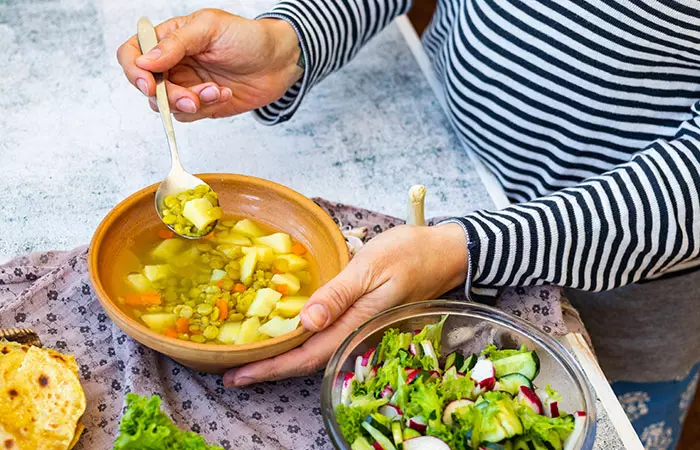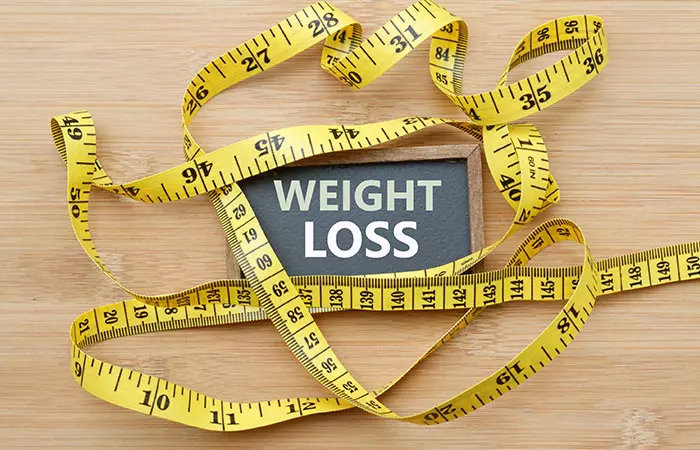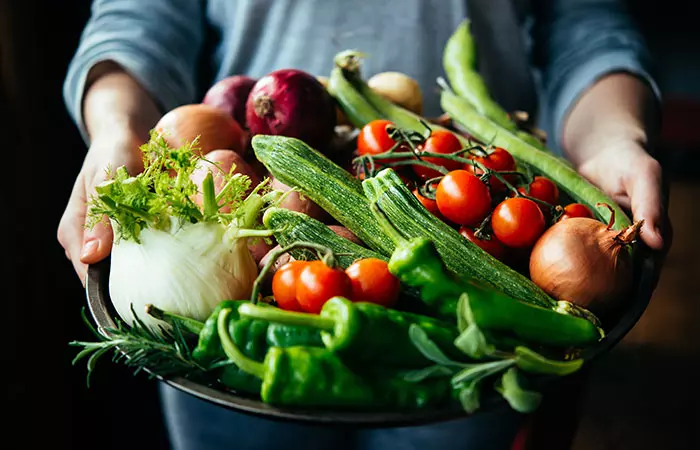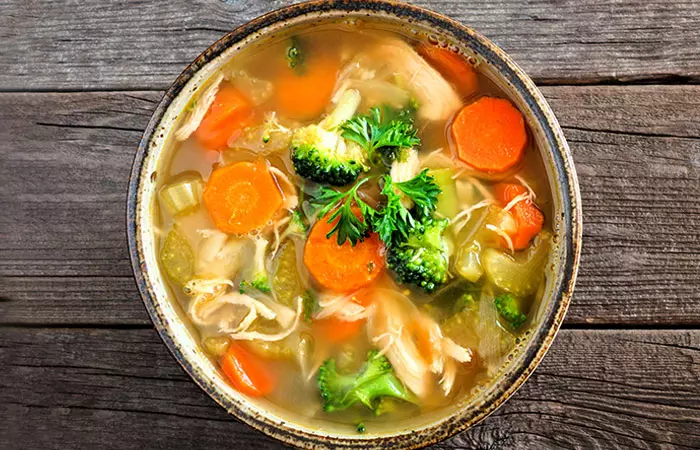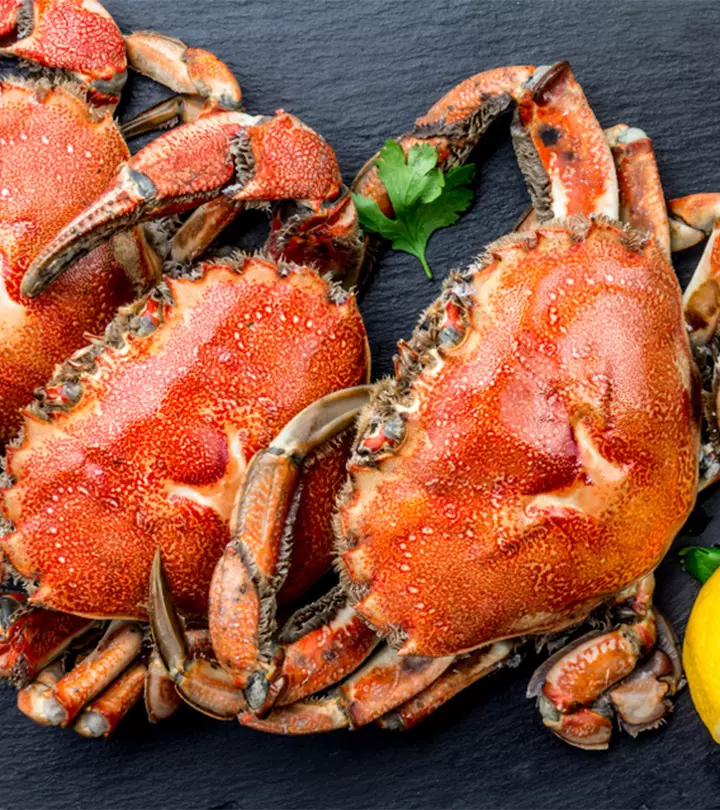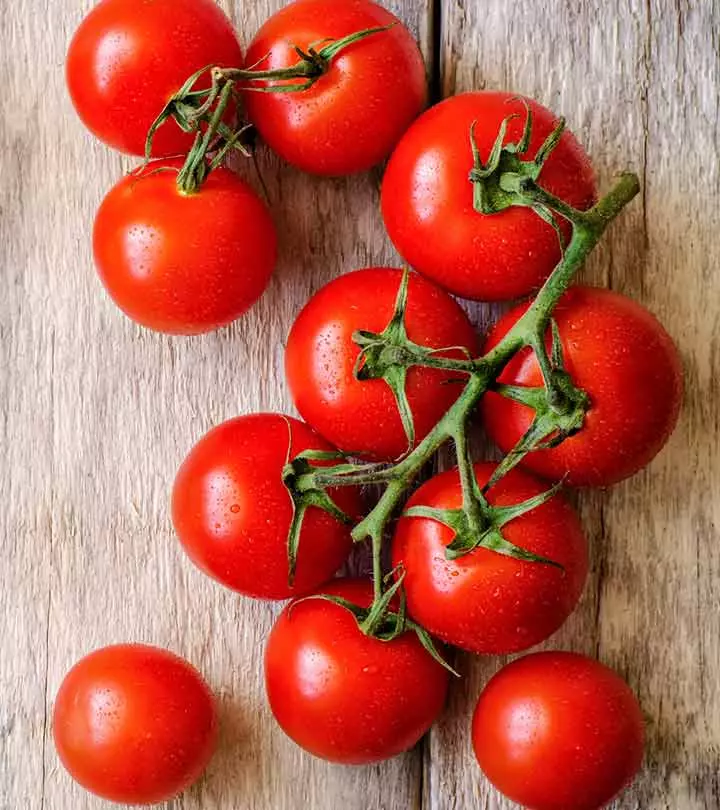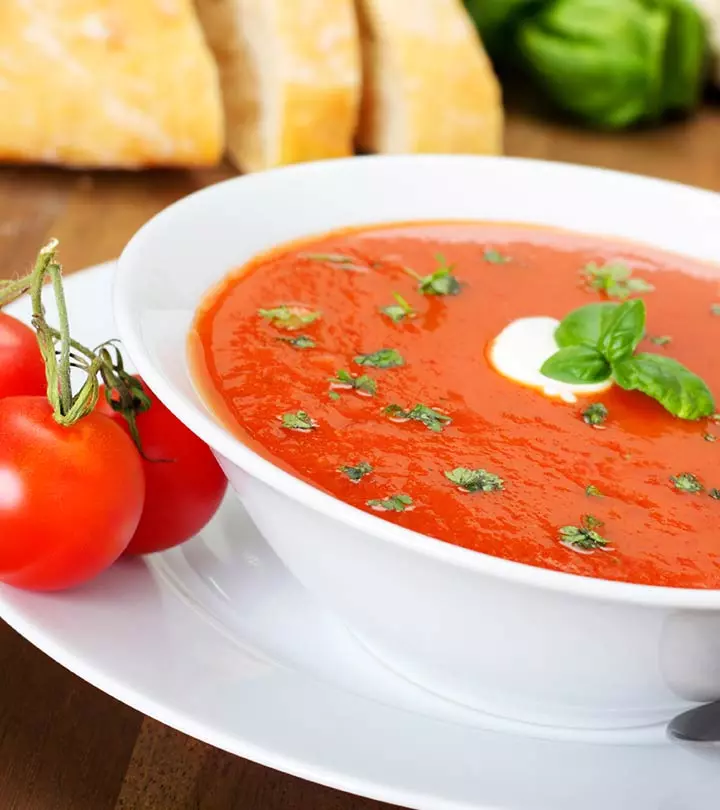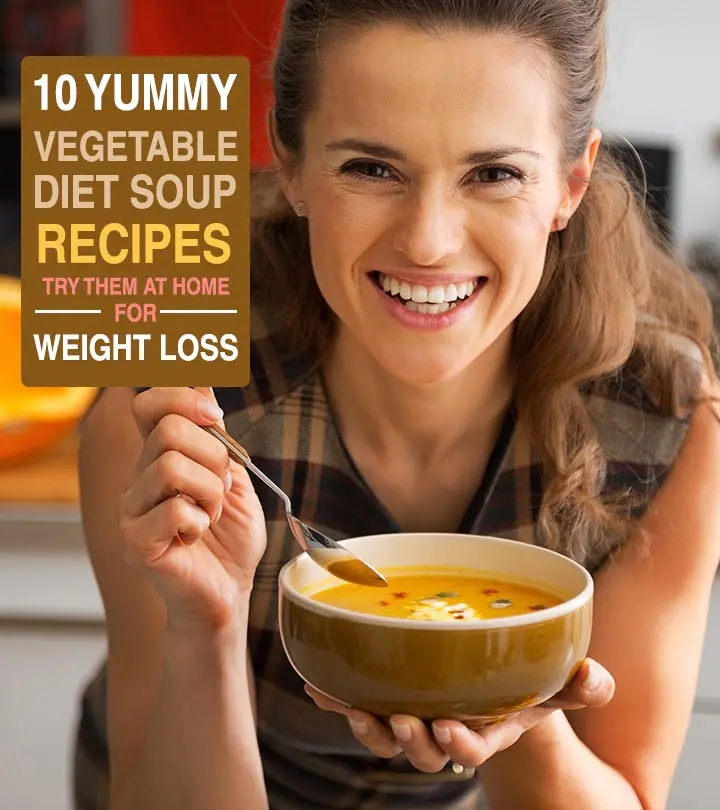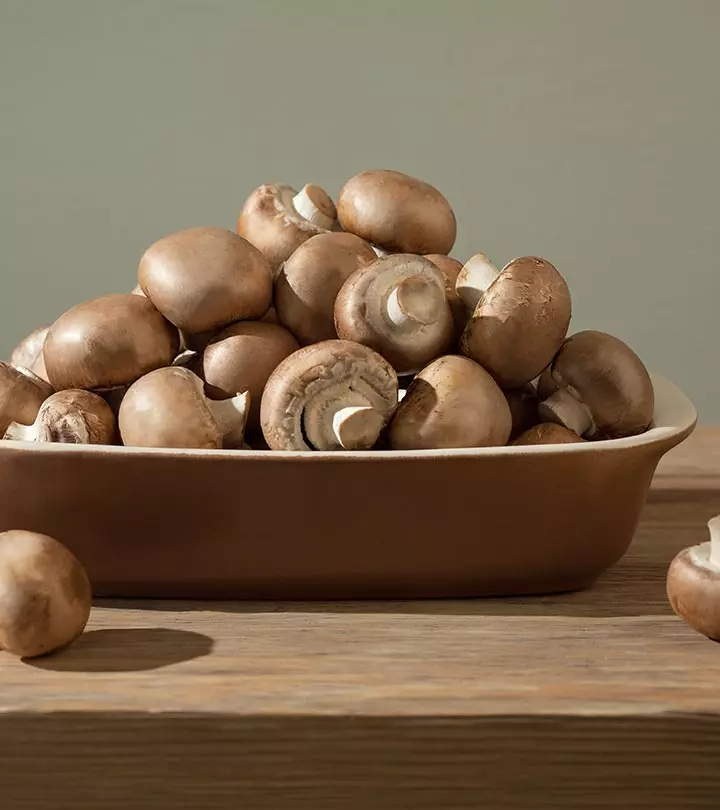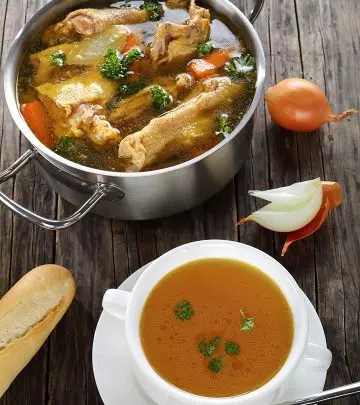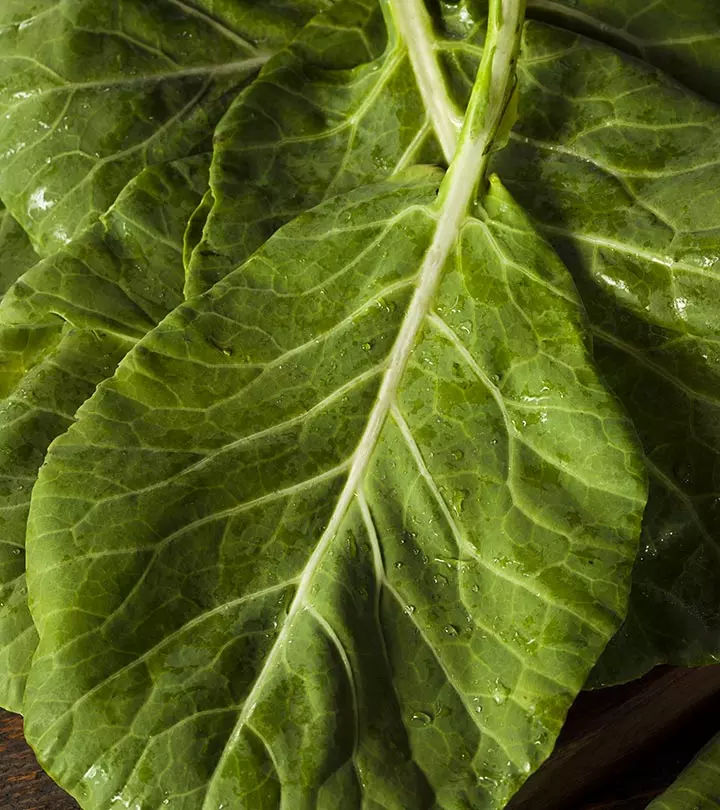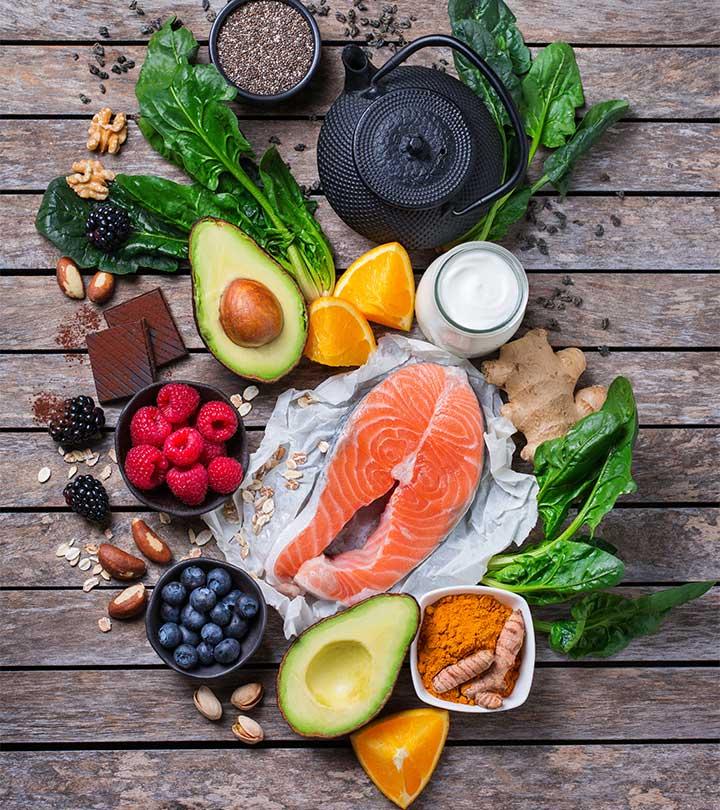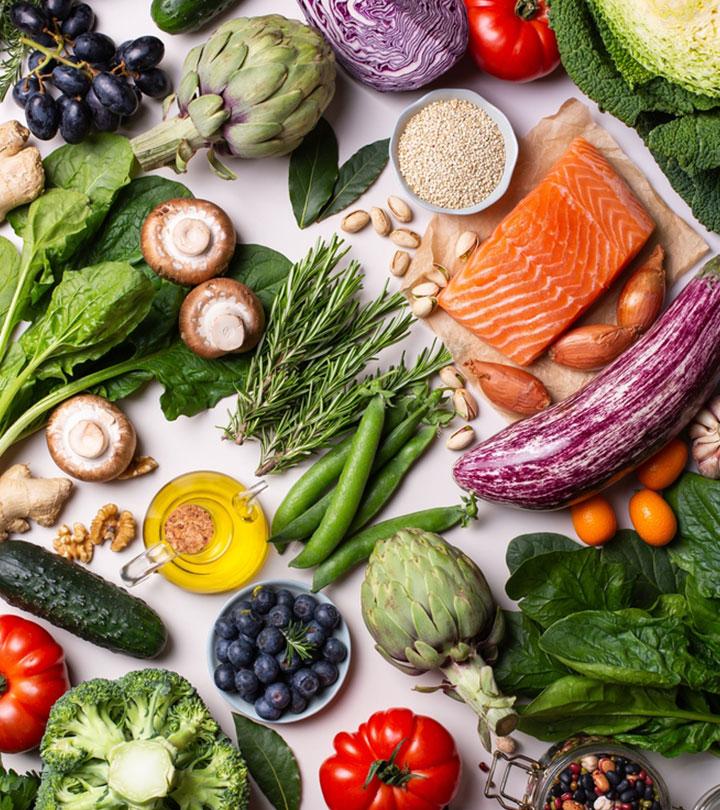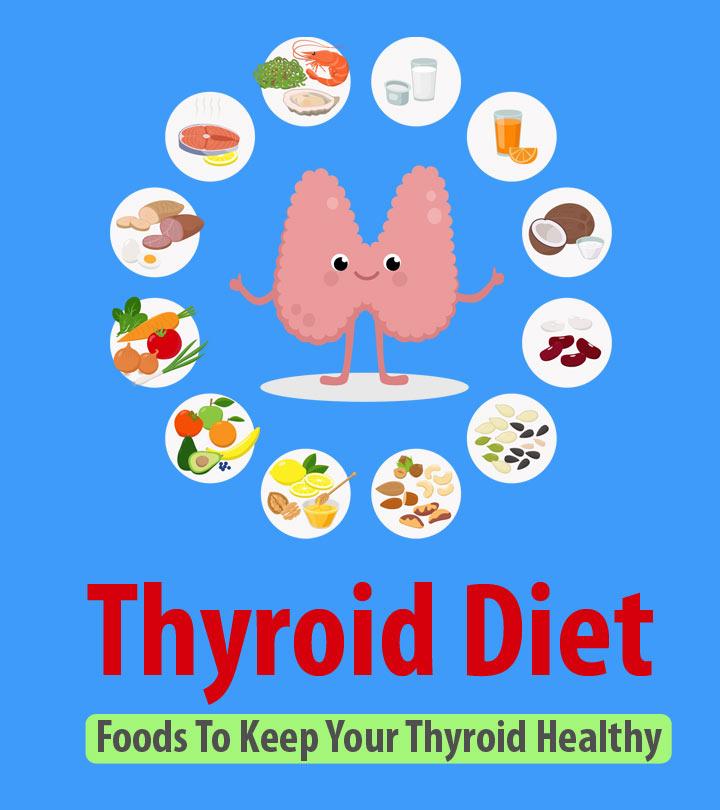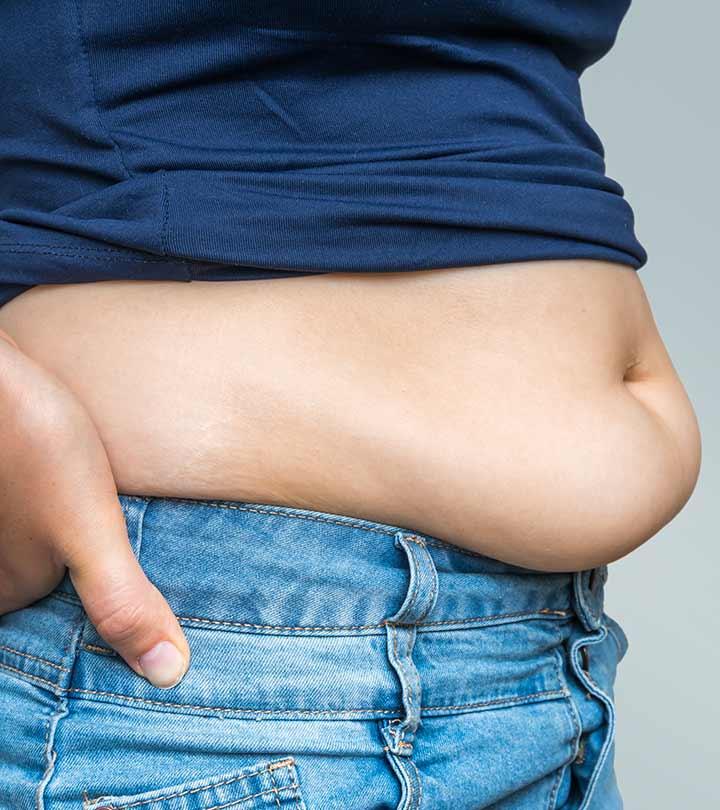Souping Diet: Health Benefits, Drawbacks, And Recipes
Give broth-based soups a try to shed some pounds!
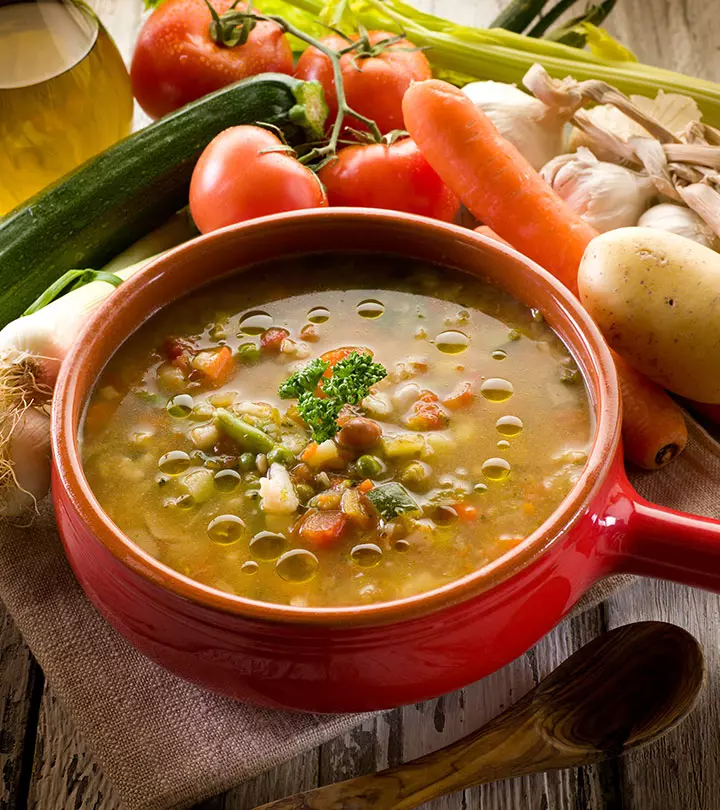
Image: Shutterstock
If you are looking to limit your calorie intake to shed a few pounds, you may check out the souping diet. This soup-focused eating pattern has a whole host of variations available, ranging from a cabbage soup diet to a chicken soup diet. However, the general idea behind this diet plan is to replace your traditional meals with mainly clear soups and a few other food options like fruits and vegetables. While they are a healthy snack, consuming only soups to aid long-term weight loss is a matter of debate among experts.
If you are thinking about giving this souping diet a try, you need to learn about its health benefits and drawbacks first. In this article, we help you uncover all the information you need to decide if the souping diet is ideal for you. Let us get started!
 At A Glance: Souping Diet
At A Glance: Souping Diet- Principle: Replacing traditional meals with clear soups and broths and cutting down processed food to reduce total calorie intake.
- Purpose: To aid weight loss.
- Who It Is For: Anyone aiming for quick weight loss.
- Duration: Short-term.
- Who Should Avoid: Children, pregnant and breastfeeding women, and people with (a history of) eating disorders, underlying health conditions like diabetes, or nutritional deficiencies.
- Cons: Very restrictive and may result in rebound weight gain.
In This Article
What Is The Souping Diet?
This diet involves the consumption of nothing but soup either by itself or along with a few other healthy foods. Anecdotal evidence indicates that the diet leads to significant weight loss when done for a short duration of 7 days. The idea behind this diet is that consuming soups may boost satiety, thus preventing overeating and aiding weight loss. However, there is no scientific evidence to suggest that this diet works for long-term weight management.
 Did You Know?
Did You Know?The kind of soup you can consume depends on the type of weight-loss soup diet you are following. Check out the next section to know more.
Different Types Of Soup Diets
1. Broth-Based Soup Diet
This version of the souping diet involves consuming soups made with broth as the base. These soups are usually rich in vegetables and lean proteins and are free of cream or fatty foods like dairy. The diet may last for about 7-14 days, and anecdotal evidence suggests that it may help you lose about 4-8 kgs.
2. Bean Soup Diet
This diet focuses on the consumption of bean-based soups as two main meals daily. These soups may include ingredients like pinto beans, chili peppers, mushrooms, bell peppers, celery, and diced tomatoes. The followers of the diet are also encouraged to avoid or limit avocados, dried fruits, nuts, and seeds.
3. Chicken Soup Diet
This diet lasts for 7 days and centers around the consumption of chicken soup as the primary source of nourishment, with the exception of breakfast. The diet provides a specific recipe for chicken soup and gives five different breakfast options that include foods like non-fat vanilla yogurt and whole-grain bread. People claim to lose at least 5-7 kgs on this diet.
4. Keto Soup Diet
This version is 5 days long and may help break through a weight loss plateau. It was designed by Mellissa Sevigny, a food blogger and author. She claims that the chicken and vegetable-based soup consumed on this diet may help you lose up to 10 pounds of weight. This diet also restricts the use of sweeteners, nuts, and dairy, with the exception of butter, as Sevigny says that it is pure fat and will not affect the weight loss process.
5. Sacred Heart Soup Diet
This 7-day diet allows the consumption of specific foods, like fruits and vegetables, each day paired with a special soup made with beef or chicken broth and vegetables like celery and green beans. Some people claim that this diet originated in the Sacred Heart Memorial Hospital to help obese patients lose weight before surgery, but this claim has not been verified.
6. Vegetable Soup Diet
This diet is designed for quick weight loss and involves eating only a vegetable-based soup for seven days. The soup contains clear vegetable broth and vegetables such as broccoli, cauliflower, green and red bell peppers, and carrots.
7. Cabbage Soup Diet
This 7-day diet works like a rapid weight loss program in which you primarily consume cabbage soup. While the main ingredient of this soup is cabbage, it may also include other vegetables like onion and celery and vegetable or chicken broth. Anecdotal evidence suggests that this diet may help you lose 7-10 pounds of body weight.
8. Detox Soup Diet
This version is a 3-day, short-term dietary plan that involves the consumption of soups made from ingredients that are believed to help detoxify the body. These ingredients include green leafy vegetables like kale and spinach and fiber-rich fruits like apples or oranges.
9. Juice And Smoothie Souping Diet
This version combines liquid-based meals and light soups for quick weight loss. The soups in this diet are usually made of legumes, grains, and vegetables, while the smoothies and juices are made from fruits and vegetables like sweet potatoes, butternut squash, and carrots.
10. Canned Soup Diet
This diet allows the consumption of canned soups instead of homemade ones. However, it should be broth-based, like clear vegetable or chicken soup, and not cream or cheese-based soups that are high in calories.
11. Other Soup Diets
Apart from all the souping diets mentioned above, there are several other versions you may try. Some of them include leek soup, soup and salad, high-protein soup, and tomato soup diets. All these diets are usually followed for a short duration and claim to provide rapid weight loss. However, there are no scientific studies to support their effectiveness.
All of these versions of the soup diet only make us wonder if the diet actually has any benefits. Let us find out in the next section.
Potential Benefits Of The Soup Diet
May Aid Weight Loss
Research suggests that individuals who regularly consume soup tend to have a lower body mass index and waist-to-hip ratio (1). However, this research is conducted on soups in general and not on specific souping diets. Currently, there is no scientific evidence on the effectiveness of any soup diet for weight loss. Moreover, a soup diet is not really a balanced diet and may lead to nutritional deficiencies. Therefore, consult with a certified nutritionist/dietitian before starting a soup diet and get personalized advice to plan a wholesome diet for weight loss.
 Did You Know?
Did You Know?Keeps You Satiated
A study states that soup consumption increases the feeling of fullness and reduces hunger pangs (2). This may be because consuming soup slowly helps you savor its flavor, enjoy the meal, and lead to greater satisfaction. However, it isn’t sustainable in the long run.
May Increase Vegetable Intake
Since most soups contain vegetables, adding them to your diet may increase your intake of vegetables. This may aid in effective weight management (3). Vegetables are loaded with healthy nutrients like vitamins and antioxidants that can improve your health. However, since the soup diet is usually short-term, this increased vegetable intake for 7-14 days is unlikely to have long-term health benefits.
May Increase Fiber Intake
Since soups are made primarily of vegetables, they may also increase your fiber intake. This, in turn, may provide satiety-inducing effects and help manage gastrointestinal disorders like diverticulitisi An infection of the small pouches present in the digestive tract that is characterized by symptoms like fever. and constipation (4), (5). Fiber may also improve metabolic health and regulate bowel movements.
May Increase Water Intake
Soups are primarily made with a liquid base, mainly broth or water. And the vegetables used in them may have water content of their own (6). Consuming these soups may increase your water intake, which may have weight-reducing effects (7).
May Encourage Plant-Based Eating
Most soups are centered around vegetables and may help you consume lots of vegetables that you may not like otherwise. Thus, a soup diet may encourage plant-based eating, which has numerous benefits like reduced blood pressure and cholesterol levels (8).
May Reduce The Risk Of Heart Disease
Many people opt to consume only vegetarian soups on this diet. Research suggests that following a plant-based diet may reduce the risk of heart disease (8). However, there is no scientific evidence that links a soup diet with a reduced risk of heart disease in this regard.
Is Easy To Follow
Soup diets are often straightforward and easy to follow. You mainly consume soup as your primary meal, which simplifies meal planning and preparation, especially for busy individuals. Also, soups can be prepared in large batches, making the process even simpler.
Weight loss is considered a major benefit of the soup diet. But how does one follow it to lose weight? Let us find out.
How Do You Follow The Soup Diet For Weight Loss?
Different soup diets have different rules you need to follow. However, most of them are usually short-term and followed for a week. Most soup diets follow a similar pattern:
- The diet requires you to consume 3-5 bowls of soup per day.
- Some soup diet versions allow you to consume other foods on specific days. For instance, you may eat all fruits except bananas on the first day of the diet and banana and skimmed milk on the fourth day of the diet.
- While some souping diet types may also allow you to consume certain vegetables along with the soups, it is best to eat them boiled or raw. Do not deep-fry or oil-cook the vegetables.
- The diet also requires you to drink at least four glasses of water each day.
- Some versions of the diet also recommend taking a multivitamin supplement every day to meet your nutrition requirements.
- Lastly, you only have to follow the diet for seven days, after which you may resume your normal diet. Do not continue the soup diet for more than a week without consulting your doctor.
The purpose of consuming these foods is to lower the amount of calories you consume. While this may result in weight loss, there is a possibility that you may regain the lost weight once you start consuming your regular diet.
Experts do not recommend the soup diet due to its restrictive eating pattern and lack of scientific basis. However, if you still want to follow it, check out the next section to find out what an entire week on this diet looks like.
7-Day Soup Diet Plan For Weight Loss
Let us take the cabbage soup diet as an example to see what a 7-day soup diet plan for weight loss looks like.
| Day | What To Eat |
| Day 1 |
|
| Day 2 |
|
| Day 3 |
|
| Day 4 |
|
| Day 5 |
|
| Day 6 |
|
| Day 7 |
|
The cabbage soup diet mainly focuses on cabbage soup, fruits, and vegetables. But what about the other soup diets? Check out the next section to find out what foods are allowed while following them.
What Can You Eat On A Soup Diet?
Every variation of the soup diet is unique and has different foods that are encouraged. However, most of them require you to make broth-based soups that may require some of the following ingredients:
- Clear broth as the base ingredient, like chicken broth, vegetable broth, fish stock, or beef broth.
- Vegetables like onions, carrots, tomatoes, turnips, kale, spinach, celery, etc.
- Spices like cayenne pepper, salt, and black pepper for flavor.
- Some soup diets also allow the consumption of fresh fruits like melons and oranges.
Soup diets are typically very restrictive, and apart from healthy fruits and vegetables, most of them limit the consumption of all other foods. Let us check them out below.
What Can You Not Eat On A Soup Diet?
Here is a list of some common food items that you should avoid on most soup diets:
- Fast foods like French fries, hamburgers, hot dogs, and pizza.
- Refined carbohydrates like white bread, pasta, and rice.
- Sugary foods and beverages like soda, cereal, chocolate, candy, and cookies.
- Dairy products like full-fat milk, cheese, and full-fat yogurt.
- Processed snacks like crackers and chips.
- High-calorie condiments like mayonnaise and heavy cream.
The specific restrictions and guidelines of a soup diet can vary depending on the diet plan you are following. However, one thing that is common among all these diets is the consumption of soup. Let us check out a few soup diet recipes that you can try out below.
Soup Diet Recipes To Try Out
Chicken Soup
Ingredients
- 2 tablespoons oil
- 1 tablespoon garlic, minced
- 1 jalapeno, seeded and chopped
- 1 parsnip, diced
- 1 rib of celery, diced
- 1 turnip, diced
- 1 cup carrots, diced
- 1 cup collard greens, diced
- 1 cup broccoli florets, chopped
- 60 g chicken, boiled
- 1 cup onions, diced
- 4 cups chicken broth
- 2 tablespoons lemon juice
- 1 teaspoon salt
- ½ teaspoon cayenne pepper
- 2 tablespoons fresh dill, chopped
How To Prepare
- Heat up the oil in a large pot over medium heat.
- Add the garlic, parsnip, jalapeno, celery, and turnip to the pot.
- Cook until the vegetables are tender but still a bit crisp.
- Add the carrots, broccoli, onions, collard greens, chicken broth, and boiled chicken.
- Bring it to a boil and simmer for five minutes.
- Add salt, pepper, lime juice, and chopped dill.
- Cook for a minute and turn off the heat.
Cabbage Soup
Ingredients
- 2 tablespoons oil
- ½ cabbage, chopped
- 1 cup onion, diced
- 1 cup carrots, diced
- 1 cup celery, diced
- 4 cups chicken broth
- 1 bell pepper, diced
- 2-3 cloves garlic, minced
- 2 cups tomatoes, diced
- 1 teaspoon oregano
- 1 teaspoon basil
- ½ teaspoon salt
- ½ teaspoon red pepper
- ½ teaspoon black pepper
How To Prepare
- Heat up the oil in a large pot over medium heat.
- Add the onions, garlic, bell peppers, celery, and carrots into the pot.
- Cook until the vegetables are tender but still have a bite to them.
- Pour in the chicken broth and add the tomatoes and cabbage.
- Bring the soup to a boil and simmer for 5 minutes or until the cabbage is tender.
- Add the basil, red and black pepper, oregano, and salt.
- Cook for a minute and turn off the heat.
While the soups consumed on the souping diet are healthy, the diet itself is not recommended by experts due to its restrictive nature. Let us take a look at its other disadvantages.
Drawbacks Of A Soup Diet
May Result In Rebound Weight Gain
The souping diet lasts only a week, so chances are that the weight you lose is water weight. Water weight can easily be regained once you return to your previous eating habits. Therefore, this diet is not a good solution for long-term weight loss and weight maintenance.
May Not Contain Adequate Nutrients
Most soups consumed on the diet are very low in calories and may not be able to meet your body’s energy and nutritional needs. Further, soups are mostly plant-based, and consuming them alone may increase the risk of deficiency of vitamins and minerals like vitamin B12, vitamin D, calcium, iron, and zinc (8).
May Be Low In Protein
If a soup diet requires you to consume only vegetable soup for weight loss, it may lack protein, which may result in protein deficiency and cause physical weakness and edemai The swelling that mainly occurs in the legs, feet, and ankles due to excess fluid trapped in the body’s tissues. (9).
May Be High In Salt Content
Research suggests that soup consumption is linked with a higher intake of sodium (10). This, in turn, is associated with health conditions like high blood pressure and risk of stroke (11). Therefore, people with hypertension and poor heart health should avoid this diet.
Is Highly Restrictive
The soup diet often revolves around a narrow selection of soups, making it restrictive in nature. If continued for a long duration, it can become monotonous and unappealing (8).
Is Unsustainable
Many soup diets are mainly designed for short-term weight loss goals and do not provide a sustainable approach to long-term health and nutrition. They are not meant to be followed long-term and may be difficult to maintain.
May Eliminate Healthy Foods
A strict and prolonged soup diet potentially eliminates a wide variety of healthy food groups, such as whole grains and dairy products, from your diet and makes it limited. Further, it may not provide the same level of satisfaction as solid foods, potentially leading to increased hunger and cravings.
Makes You Feel Deprived
A soup diet can make you feel deprived and stuck in social situations or when you are dining out, which can lead to feelings of isolation and restriction. Anecdotal evidence also suggests that eating nothing but soup for weight loss may lead to side effects like flatulence, dizziness, and headache.
As the souping diet replaces your traditional meals with soups, it may not meet your daily nutritional needs. But if you decide to go ahead with it, here is a list of some key nutrients that must be a part of your daily intake.
Key Nutrients To Include In Your Souping Diet
Macronutrients
- Protein: Research suggests that you need at least 0.8 g of protein per kg of your body weight (12). Some protein-rich foods you can add to your soups include lean meats, fish, eggs, nuts, lentils, and beans.
- Healthy Fats: As per the dietary guidelines from the World Health Organization, your total recommended fat intake should be 20-35% of total consumed calories (13). Some healthy, fat-rich foods you can add to your soups are olive oil, avocados, and nut butter.
- Fiber: The current recommendations suggest that your dietary fiber intake should be 30-35 g per day for men and 25-32 g per day for women (14). Some fiber-rich foods you can add to your soups include vegetables like broccoli and legumes like lentils and black beans.
Micronutrients
Research suggests that vitamins and minerals like vitamin C, B vitamins, iron, and magnesium are needed by the body to extract energy from food (15). Therefore, you should add them to your souping diet. Some foods that are rich in these micronutrients include nuts and seeds and fruits and vegetables like peas, spinach, and oranges.
Note: While adding any of these nutrients to your diet, especially in the form of supplements, always consult with your healthcare provider first.
Frequently Asked Questions
Which soup is best for weight loss?
Clear broth-based soups that are low-calorie and high in vegetables may help with weight loss, as they are rich in fiber which may provide satiety-inducing effects (4).
Can I eat soup every day?
Yes, you may eat soup every day as it is low in calories and made from nourishing vegetables. However, avoid cream-based soups that are high in calories to prevent weight gain. Also, since soups are linked with a higher intake of sodium, try to consume ones that have a low salt content (10).
Is soup good for belly fat?
There is no scientific evidence that proves that soup may be good for belly fat. However, research suggests that soup consumption increases the feeling of fullness, which may prevent overeating and help you lose weight (2).
Can you eat too much soup?
Yes, it is possible to eat too much soup, just as it is with any type of food. And since most soups are high in sodium, it may increase the risk of health conditions like high blood pressure (11).
Can we drink soup in the morning for weight loss?
Yes, you may drink soup in the morning for weight loss. However, it is not recommended to replace your morning meal completely with soup, as it may not contain all the nutrients needed by your body. For instance, if you are consuming vegetable soup, it may not have enough protein in it.
How many calories are in a bowl of soup?
The number of calories in a bowl of soup depends on the kind of soup and the ingredients that go into it. In general, a cup of vegetable soup may have around 98-100 calories, a cup of chicken soup may have 87-90 calories, and a cup of lentil soup may have 138-140 calories.
Key Takeaways
- The souping diet involves the consumption of just soup or soup in conjunction with other foods like fruits and vegetables to aid in weight loss.
- The bean soup, chicken soup, keto soup, sacred heart, and cabbage soup diets are some of the variations of the souping diet.
- All these diets have no scientific backing and are not ideal for long-term weight management.
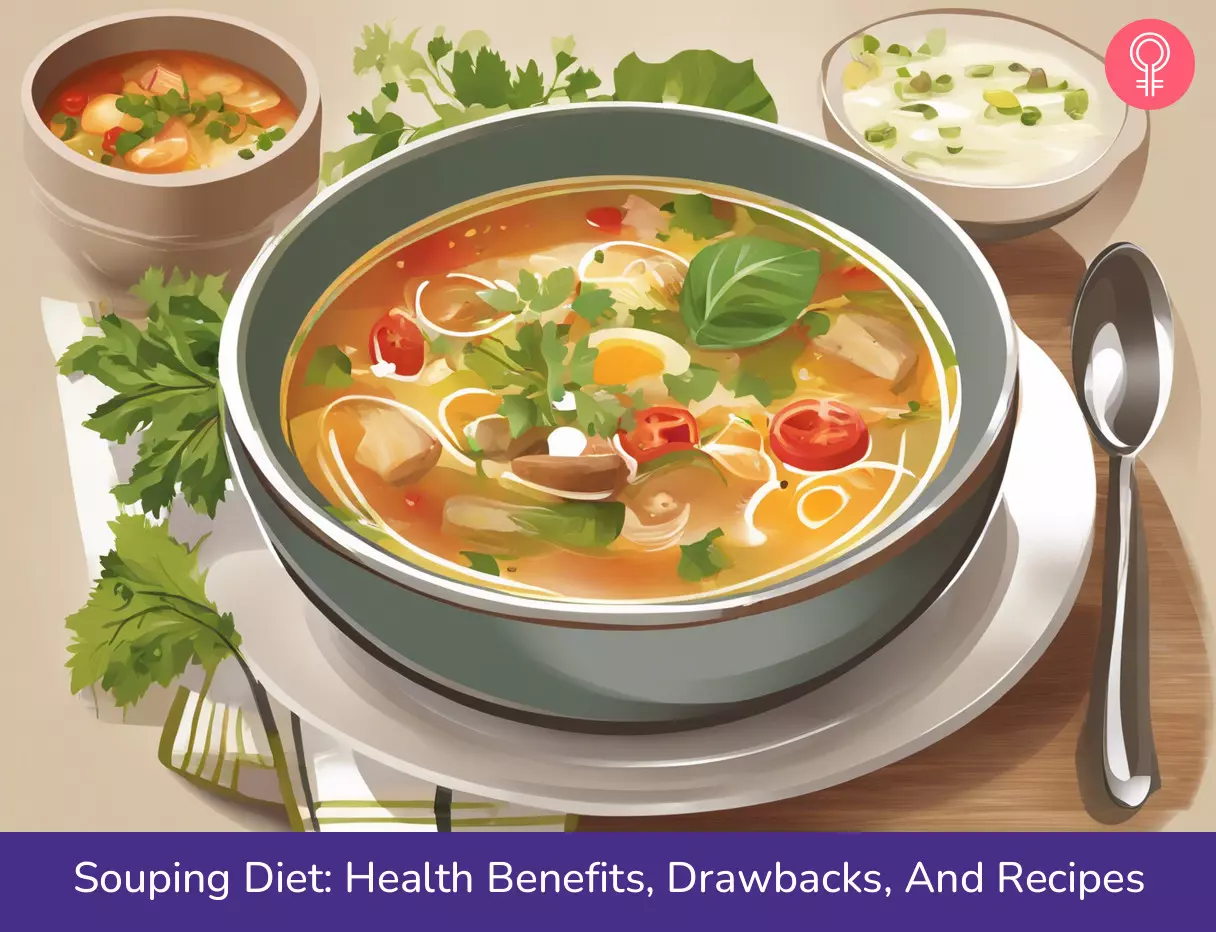
Image: Stable Diffusion/StyleCraze Design Team
Soup diets are trending in the diet world and are extremely popular among people who want to lose weight quickly. However, do they actually work? Check out this video to find out!
References
Articles on StyleCraze are backed by verified information from peer-reviewed and academic research papers, reputed organizations, research institutions, and medical associations to ensure accuracy and relevance. Read our editorial policy to learn more.
- Frequency of soup intake is inversely associated with body mass index, waist circumference, and waist-to-hip ratio, but not with other metabolic risk factors in Japanese men
https://pubmed.ncbi.nlm.nih.gov/21185976/ - Soup and satiety
https://pubmed.ncbi.nlm.nih.gov/15639159/ - The relationship between vegetable intake and weight outcomes: a systematic review of cohort studies
https://www.ncbi.nlm.nih.gov/pmc/articles/PMC6266069/ - The role of fiber in energy balance
https://www.ncbi.nlm.nih.gov/pmc/articles/PMC6360548/ - Health benefits of dietary fiber
https://pubmed.ncbi.nlm.nih.gov/19335713/ - Water, hydration, and health
https://www.ncbi.nlm.nih.gov/pmc/articles/PMC2908954/ - Association between water consumption and body weight outcomes: a systematic review
https://pubmed.ncbi.nlm.nih.gov/23803882/ - A look at plant-based diets
https://www.ncbi.nlm.nih.gov/pmc/articles/PMC8210981/ - Dietary protein intake and human health
https://pubmed.ncbi.nlm.nih.gov/26797090/ - Soup consumption is associated with a lower dietary energy density and a better diet quality in US adults
https://pubmed.ncbi.nlm.nih.gov/24382211/ - Reducing population salt intake worldwide: from evidence to implementation
https://pubmed.ncbi.nlm.nih.gov/20226955/ - Protein for life: review of optimal protein intake, sustainable dietary sources and the effect on appetite in aging adults
https://www.ncbi.nlm.nih.gov/pmc/articles/PMC5872778/ - A healthy approach to dietary fats: understanding the science and taking action to reduce consumer confusion
https://www.ncbi.nlm.nih.gov/pmc/articles/PMC5577766/ - The health benefits of dietary fiber
https://www.ncbi.nlm.nih.gov/pmc/articles/PMC7589116/ - Vitamins and minerals for energy, fatigue, and cognition: a narrative review of the biochemical and clinical evidence
https://www.ncbi.nlm.nih.gov/pmc/articles/PMC7019700/
Read full bio of Dr. Pallavi Srivastava
Read full bio of Arshiya Syeda
Read full bio of Moksha Gandhi





